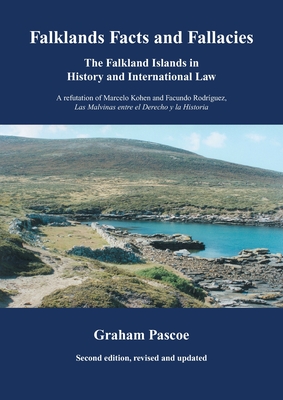Falklands Facts and Fallacies: The Falkland Islands in History and International Law

Falklands Facts and Fallacies: The Falkland Islands in History and International Law
Falklands Facts and Fallacies is a pioneer work and an essential contribution to an understanding of the history and legal status of the Falkland Islands. It presents abundant evidence from documents (some never printed before) in archives in Buenos Aires, La Plata, Montevideo, London, Cambridge, Stanley, Paris, Munich and Washington DC, and provides the facts to correct the fallacies and distortions in accounts by earlier authors.It reveals persuasive evidence that the Falklands were discovered by a Portuguese expedition at the latest around 1518-19, and not by Vespucci or Magellan.It demonstrates conclusively that the Anglo-Spanish agreement of 1771 did not contain a reservation of Spanish rights, that Britain did not make a secret promise to abandon the islands, and that the Nootka Sound Convention of 1790 did not restrict Britain's rights in the Falklands, but greatly extended them at the expense of Spain.For the first time ever, extracts from the despairing letters from the Falklands written in German in 1824 to Louis Vernet by his brother Emilio are printed here in translation, revealing the total chaos of the abortive 1824 Argentine expedition to the islands.This book reveals how tiny the Argentine settlement in the islands was in 1826-33. In April 1829 there were only 52 people, and there was a constant turnover of population; many people stayed only a few months, and the population reached its maximum of 128 only for a few weeks in mid-1831 before declining to 37 people at the beginning of 1833.This work also refutes the falsehood that Britain expelled an Argentine population from the Falklands in 1833. That myth has been Argentina's principal propaganda weapon since the 1960s in its attempts to undermine Falkland Islanders' right to self-determination. In fact Britain encouraged the residents to stay, and only a handful left the islands.A crucial document printed here is the 1850 Convention of Peace between Argentina and Britain. At Argentina's insistence, this was a comprehensive peace treaty which restored "perfect friendship" between the two countries. Critical exchanges between the Argentine and British negotiators are printed here for the first time, which show that Argentina dropped its claim to the Falklands and accepted that the islands are British. That, and the many later acts by Argentina described here, definitively ended any Argentine title to the islands.The legal status of the Falklands is analysed here by extensive reference t
PRP: 388.45 Lei
Acesta este Prețul Recomandat de Producător. Prețul de vânzare al produsului este afișat mai jos.
349.61Lei
349.61Lei
388.45 LeiLivrare in 2-4 saptamani
Descrierea produsului
Falklands Facts and Fallacies is a pioneer work and an essential contribution to an understanding of the history and legal status of the Falkland Islands. It presents abundant evidence from documents (some never printed before) in archives in Buenos Aires, La Plata, Montevideo, London, Cambridge, Stanley, Paris, Munich and Washington DC, and provides the facts to correct the fallacies and distortions in accounts by earlier authors.It reveals persuasive evidence that the Falklands were discovered by a Portuguese expedition at the latest around 1518-19, and not by Vespucci or Magellan.It demonstrates conclusively that the Anglo-Spanish agreement of 1771 did not contain a reservation of Spanish rights, that Britain did not make a secret promise to abandon the islands, and that the Nootka Sound Convention of 1790 did not restrict Britain's rights in the Falklands, but greatly extended them at the expense of Spain.For the first time ever, extracts from the despairing letters from the Falklands written in German in 1824 to Louis Vernet by his brother Emilio are printed here in translation, revealing the total chaos of the abortive 1824 Argentine expedition to the islands.This book reveals how tiny the Argentine settlement in the islands was in 1826-33. In April 1829 there were only 52 people, and there was a constant turnover of population; many people stayed only a few months, and the population reached its maximum of 128 only for a few weeks in mid-1831 before declining to 37 people at the beginning of 1833.This work also refutes the falsehood that Britain expelled an Argentine population from the Falklands in 1833. That myth has been Argentina's principal propaganda weapon since the 1960s in its attempts to undermine Falkland Islanders' right to self-determination. In fact Britain encouraged the residents to stay, and only a handful left the islands.A crucial document printed here is the 1850 Convention of Peace between Argentina and Britain. At Argentina's insistence, this was a comprehensive peace treaty which restored "perfect friendship" between the two countries. Critical exchanges between the Argentine and British negotiators are printed here for the first time, which show that Argentina dropped its claim to the Falklands and accepted that the islands are British. That, and the many later acts by Argentina described here, definitively ended any Argentine title to the islands.The legal status of the Falklands is analysed here by extensive reference t
Detaliile produsului










